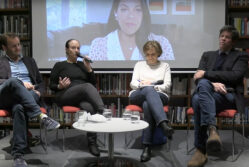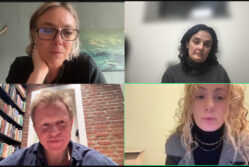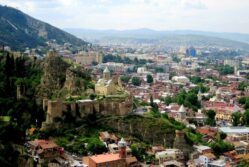Archive Event Highlight

Journalists Discuss Unrest in Georgia
by Chad Bouchard
Journalists covering upheaval in Georgia said during a Dec. 13 panel that riot police are targeting journalists as well as protesters, and norms of press freedom have shifted suddenly in recent weeks.
The OPC program, held on the eve of the ruling party’s appointment of a contentious anti-Western president, was part of the “In the Thick of It” series. The panelists were three reporters who have been on the ground in Tbilisi, and discussed the protests, violence and challenges in covering the conflict.
Singeli Agnew, a documentary filmmaker and governor of the OPC, moderated the discussion.
Georgia has experienced prolonged mass protests since the ruling Georgian Dream party claimed victory in the Oct. 26 elections, a result contested by opposition parties. Tensions escalated after Prime Minister Irakli Kobakhidze announced on Nov. 28 that Georgia would halt its EU accession talks, triggering more demonstrations and a police crackdown.
The Committee to Protect Journalists on Dec. 4 said at least 50 journalists had been injured during violent police dispersals at pro-European Union demonstrations between Nov. 28 and Dec. 3.
Will Cathcart, an American journalist, producer, and former media advisor to the president of Georgia, recalled seeing an image of Georgia’s current pro-European president, Salome Zourabichvili, confronting police on Nov 28.
“She walked up to the riot police, and started tapping on their shields. She said ‘who do you serve, Georgia or Russia? You swore an oath. Who did you swear that oath to? You swore it to me, the president,’” he quoted her as saying. “And then she just walked along, almost like a grandmother scolding these guys.”
Daro Sulakauri, a Georgian photojournalist covering news for Reuters and The New York Times, described a riot police attack against a colleague that she witnessed during one of the first days of recent demonstrations.
“We were surrounded by riot police. I remember they surrounded us, and I put my hands up to say ‘don’t arrest me or don’t touch me.’ They kind of grabbed the cameraman and started beating him. I started saying ‘stop, he’s a journalist’ but I’m sure they didn’t listen to me. At some point they stopped, but he was beaten really, really badly,” Sulakauri said.
She noted that one of the first journalists to be attacked, Guram Rogava, was struck in the head by a riot policeman who was covering the protest during a live broadcast, “causing severe injuries for him including facial fractures, and he was pretty much saved because the doctor told him that if it was millimeters in a different place he would lose the feeling in his legs and hands.”
Graphic videos of that attack can be found here. Sulakauri added that police had detained about 400 people as part of their crackdown so far, many with serious injuries.
Sophiko Megrelidze, a senior producer with the Tbilisi bureau of The Associated Press who has covered the region for the last 20 years, said she has never experienced this level of police violence against media in the Georgian capital.
“I’ve covered everything, starting from war, the revolutions, terror attacks, et cetera. And recently, a few days ago, I was telling my colleagues that I have never, ever felt so insecure in Tbilisi – so insecure while doing my job,” she said. “When you’re covering, let’s say a protest, we all know the basics that we have to do in order to be safe, right? You don’t stay in the middle of the confronting sides. Find some high vantage point, et cetera. But unfortunately, this time, it wasn’t like that.”
During a Q&A, a member of the audience asked the panel why the ruling Georgian Dream party would want to side with Russia in light of its invasion in 2008, continued occupation of breakaway regions, and history of violence.
Megrelidze said that many in Georgia accuse the ruling party of leaning toward Russia. She explained that the key signs of this shift in support from Europe to Russia included the adoption of a law that created a public registry of organizations “pursuing the interest of a foreign power.” That law closely mirrors legislation passed in Russia more than a decade ago. Another indicator was the adoption of a law in October that severely restricts LGBTQIA+ rights — a move that also mirrors Russian legislation. “And then, like a big slap in the face to Georgian citizens, came the announcement about the halting of EU accession talks,” she said.
“It’s a very cynical bid to hold on to power,” Cathcart said. He said the entire government answers to Bidzina Ivanishvili, the founder of the Georgian Dream Party, a former Prime Minister of Georgia and oligarch who made his money in Russia. “So the easy answer is that he sees Russia as a way to hold on to power. But it’s more complicated than that, because he’s also afraid of Russia, so if there is going to be some sort of deal where he will leave, he will want protection from Russia.”
Watch a video recording of the program below.
Related Events



